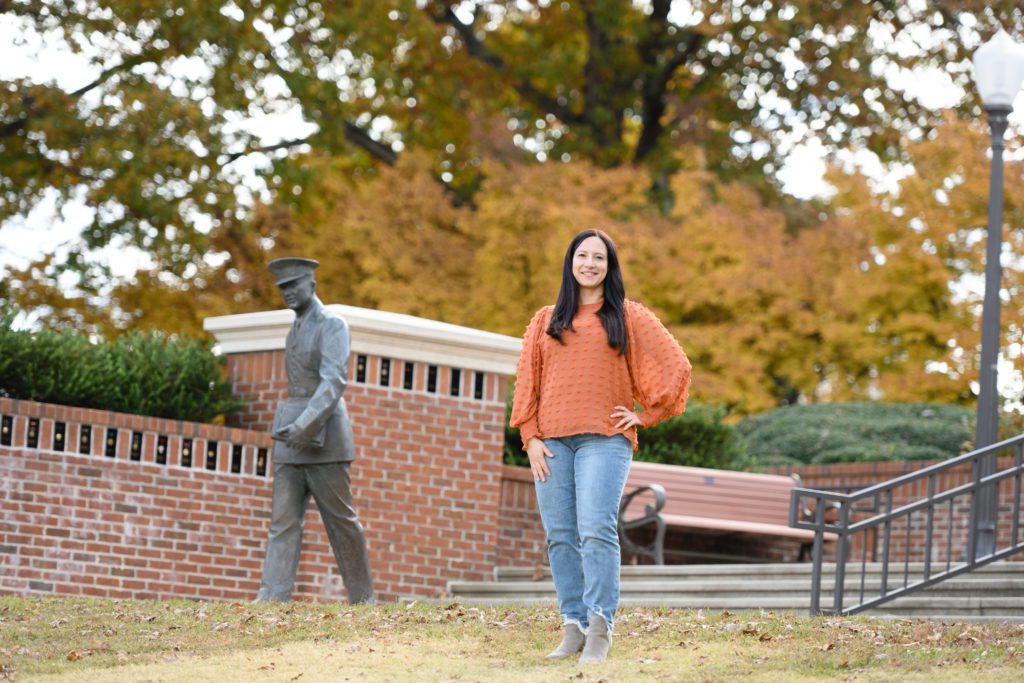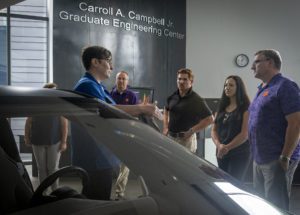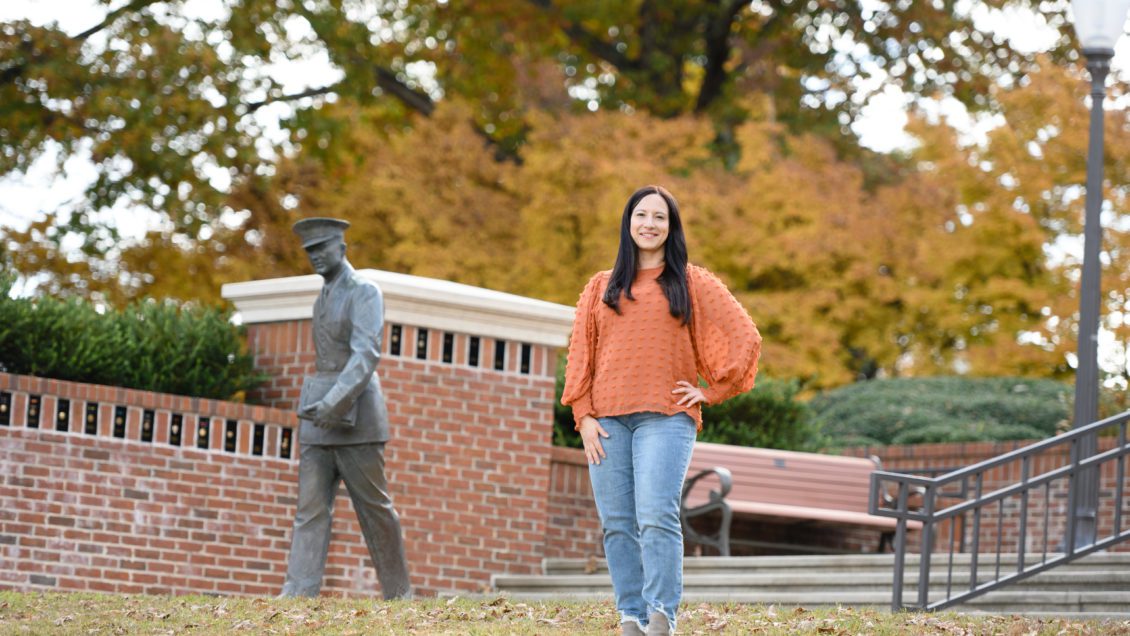Clemson University has 1,120 veterans and military-connected students currently enrolled in classes — nearly two-thirds are either spouses or dependents.
Rachelle Hales, a native of Columbia, has always called South Carolina home, even when she was traveling the country as a military spouse. She lived in six different places over the course of 20 years.
Now a junior biological sciences student at Clemson, Hales’ path back to South Carolina led to her current role as president of the Student Veterans Association (SVA). Here, she has found a supportive community and faculty connections to hands-on learning opportunities. The University’s military outreach and engagement organizations are uniquely suited to her passion for supporting those with ties to the armed services.

Military and health care
Hales was in her early 20s when she met her future husband, Noah, a combat engineer for the U.S. Army who was stationed in California at the time.
She has fond memories of being a young military spouse, recalling that their relationship was akin to that of good teammates. The intense rotation cycle Noah had proved challenging; he deployed four times over the course of his military career, for nine months to a year at a time.
It was his first deployment to Iraq in 2004 when an event unfolded that forever changed their lives.
“Noah was in an incident where his vehicle went over an improvised explosive device (IED), which caused a massive explosion,” she says. “He suffered many long-term injury effects from that, including traumatic brain injury and post-traumatic stress disorder.”
Despite his injuries, Noah would go on to serve three deployments in Southeast Asia with special operations units overseeing civil humanitarian projects, before passing away in 2020.
“It’s a little bit hard to talk about even today,” she says. But she’s come a long way to be able to share her story.
Support for veterans, support for all
Hales’ first undergraduate degree was followed by a long career in healthcare administration. But these days, she has turned her attention toward pursuing medical school; she’s interested in clinical work — most likely surgery.
Her unique experiences with helping individuals who have sustained combat injuries led her to pursue the more hands-on degree in medicine. Previously, she worked in a physical therapy office with patients who, like Noah, suffered traumatic brain injuries. She also has worked in acute outpatient care.
I’m thankful to be surrounded by such a caring community.”
Rachelle Hales, president, student veterans association
With new academic and professional goals established, Hales enrolled at Clemson in January 2021. But she knew her success meant also finding a community of support. She sought out the Military and Veteran Engagement Resource Center located in Vickery Hall and found what she was looking for.
“I’m not a veteran and wondered if I belonged,” she recalls thinking. “Everyone was so nice and welcoming and helpful. We had relatable experiences, and it felt like I was supposed to be here. I’m thankful to be surrounded by such a caring community.”
Clemson University earned silver designation for the first time as a Military Friendly School in 2022-23.
Hales joined the SVA and ultimately took the reins of the student organization late in 2021, helping advocate for student veterans and military-connected students through a variety of programs and initiatives.
“I’m thankful to have the opportunity to walk in the footsteps of student leaders before me, like Matt Morris, Ross Snead and Trevor Hobbs, who have continuously encouraged me in my role as president of SVA,” she says.
In her role, Hales assists student veterans and others in the University’s military community with the transition to college. She tries to leverage not only her own unique life experiences but also the knowledge she’s gained in a short time at Clemson to help anyone who sets foot in the resource center.
Her efforts have been noticed by Director of Military and Veteran Engagement Emily DaBruzzi, who joined Clemson’s staff this past spring.
“Running the SVA and not being a veteran herself speaks to truly embracing that every single military-connected student is important at Clemson,” says DaBruzzi, a Navy veteran. “There’s not one person questioning that Rachelle should be in her position. She deserves that seat at the table and is doing a fantastic job.”
Safer Military Vehicles
Hales and several military-connected students visited CU-ICAR over the summer for an up-close look at Clemson’s Virtual Prototyping of Ground Systems (VIPR-GS) Center. Since 2020, the U.S. Army has invested $40 million in support of research conducted at VIPR-GS on autonomous ground vehicles and the development of next-generation combat vehicles.
Hales formed an immediate connection with Johnell Brooks, a human factors psychologist and professor who led the tour. Because of her experiences caring for Noah, she wants to help make Army ground vehicles safer and service members less susceptible to serious injuries.

This fall, she has served as a research assistant under Brooks as part of the team assessing needs and challenges in existing vehicles. Hales conducts interviews with veterans and provides findings to Brooks, who long wanted to include veterans in her research program.
“I hadn’t anticipated working with a military spouse, but Rachelle’s experiences were perfect,” Brooks says. “Our lab has unique overlap between psychology, engineering and medicine, and she has been a great fit.”
Brooks says working with Hales has driven her to help that much more, because it’s expanded her focus beyond service members to spouses and dependents.
“I wasn’t aware of how many students and staff members have deployed or mobilized family members until this year,” she says. “I’m grateful for Rachelle’s openness so we as a Clemson community can do more to support our military families.”

